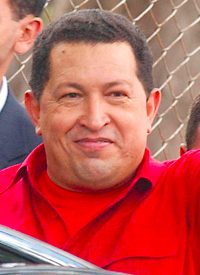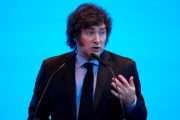
Oil-rich Venezuela also has the world’s 15th largest gold reserves, most of them squirreled away in Bank of England vaults. Now, Chavez has authorized the return of Venezuela’s gold to Venezuelan soil, fearing that, at some juncture, any overseas assets could be frozen and seized by foreign authorities, as has been done with those of Libyan dictator Muammar Gaddafi. The clownishly villainous Hugo Chavez has long worn the mantle, once borne by Cuba’s Castro, of America’s official enemy south of the border. His country and regime are now embroiled in a series of international litigations for Venezuela’s nationalizing of certain foreign assets — a Canadian gold mine at Las Cristinas and an American mining operation at Las Brisas, for example. Chavez is obviously worried that Venezuelan gold and liquid assets abroad could be seized and held as collateral.
Like the clichéd stopped clock that twice a day reads the correct time, Chavez’ militantly socialist regime appears to be doing a prudent thing, albeit for the wrong motives. It is impossible to know what the world’s central banks, including the American Federal Reserve, might be tempted to do as a last resort if their assets disappear into the growing global financial maelstrom, but confiscation of gold belonging to others is certainly not beyond the realm of possibilities. This is, after all, precisely what the U.S. government did with privately owned gold coins and bullion during the Great Depression, and again with promises to redeem dollars in gold during the Nixon administration.
In an act of naked larceny that was met with howls of outrage, FDR announced, in 1933, Executive Order 6102, which made it a criminal offense for American citizens to own or trade gold anywhere in the world, other than jewelry and some collectible coins, and authorized the government seizure of all gold coins, gold bullion, and gold certificates, which were delivered to the Federal Reserve. The following year, the Gold Reserve Act confiscated all gold held in Federal Reserve vaults and made it the property of the U.S. Treasury. The gold thus confiscated, paid for in fraudulent paper dollars with no backing whatsoever as far as ordinary Americans were concerned, has never been returned. To this day, although private ownership of gold is once again legal, the Federal Government continues to persecute any found in possession of gold coinage that was allegedly hidden from the grasping hand of the state at the time of FDR’s monumental act of theft.
After World War II, a partial gold standard promising foreign investors (but not American citizens) gold in exchange for dollars was set up. But when the cost of the Vietnam War and of Lyndon Johnson’s Great Society programs extended the Feds far beyond their ability to redeem its money (even with all the gold stolen from its own citizens almost four decades earlier), Nixon refused to honor the U.S. commitment to repay. By “closing the gold window” in August 1971, Nixon effectively authorized the U.S. government to retain possession of gold on which others were trying to exercise legal claim.
As for the British, they did the same thing on September 19, 1931, stiffing foreign holders of the pound Sterling like the Dutch government — whose anxious ministers Bank of England governor Montagu Norman had given reassurances the previous day that England would never abandon the gold standard.
No one seems to know nowadays just how much gold is held in the vaults at Fort Knox and the New York Federal Reserve, nor by whom. One suspects, however, that the efforts of Congressman Ron Paul to ascertain just how much gold the U.S. has are being thwarted by those willing to commit theft of assets to keep the U.S. Treasury and banking system afloat.
Hugo Chavez has a well-deserved reputation for paranoia. But look for other, more sober political leaders to follow his example, keeping a closer eye on their own gold reserves as the world economy continues to deteriorate.
Photo: Hugo Chavez



